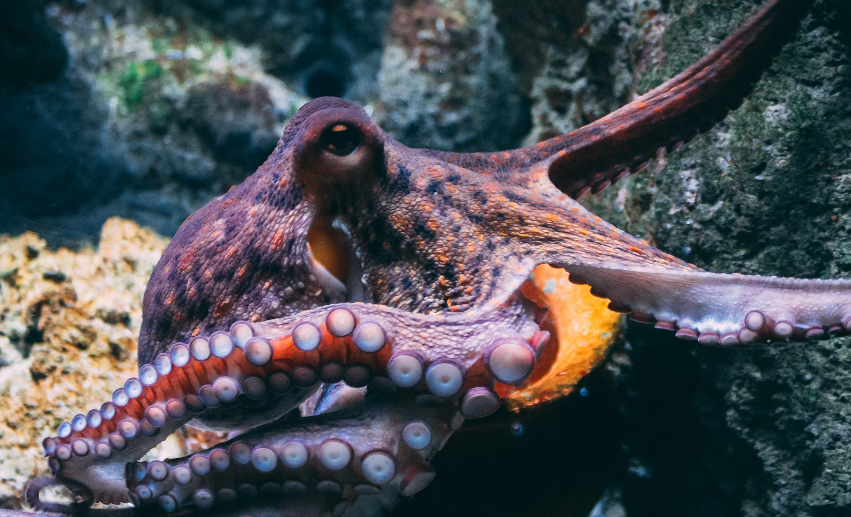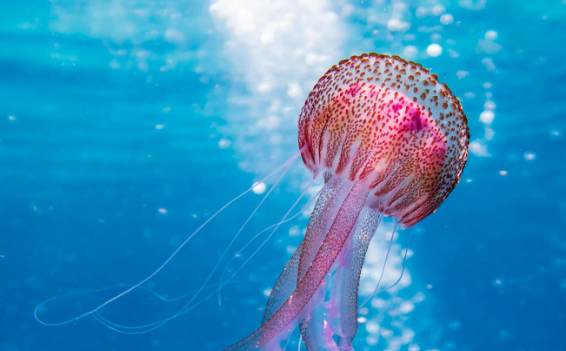The Octopus: What This Sea Creature Can Teach Us

© Diane Picchiottino / Unsplash
From their unnerving appearance to their fascinating brains, these sea creatures have more to offer than you might think. The octopus, one of the creepiest animals in the deep sea, is recognized as one of the most intelligent animals on earth. But, what happened for these majestic creatures to obtain this name, and what makes them so intelligent to begin with? Let us deep dive (no pun intended!) into more information together!
What is an Octopus?
Octopuses, also known as octopi, are part of the cephalopod family, which includes other invertebrates like squid and cuttlefish. These creatures have distinctive features, including round bodies, prominent eyes, and eight highly versatile arms. The term “cephalopod” originates from Greek, and it means “head-foot,” which is fitting since their arms are directly attached to their heads. They are marine animals that have a unique appearance and are found in oceans worldwide, with a particular abundance in warm tropical waters. While they share the “monsters of the deep” reputation with their close relative, squid, some species inhabit relatively shallow waters.
Types of Species and Diversity
These creatures exhibit remarkable species diversity, with various types found in oceans around the world. These species can vary significantly in terms of their appearance, behavior, and habitat preferences. Some of the species include:
Common Octopus
This species is widespread in temperate and tropical waters and is known for its intelligence. It has a mottled appearance and is often reddish-brown in color.
Giant Pacific Octopus
As the largest species of the family, it can have an arm span of over 20 feet. These species are typically found along the Pacific coast of North America.
Blue-Ringed Octopus
Science identifies these small, venomous octopuses through their striking blue rings. These creatures are found in the Pacific and Indian Oceans. They are highly venomous and can be dangerous to humans.
Mimic Octopus
This remarkable species can imitate the appearance and behaviors of other marine creatures, such as lionfish and flatfish, as a defense mechanism.
Dumbo Octopus
Named after the Disney character Dumbo due to their ear-like fins, these deep-sea creatures live at extreme depths, often exceeding 13,000 feet.

Coconut Octopus
These small octopuses are known for their habit of using coconut shells and other objects as shelter and protection.
Blanket Octopus
These unique species are characterized by the long, flowing membranes between their arms and have vibrant colors. They are typically found in deep offshore waters.
Greater Blue-Ringed Octopus
Similar to the blue-ringed octopus, this species is known for its potent venom and striking blue rings. It is found in the waters of the western Pacific Ocean.
Larger Pacific Striped Octopus
These octopuses are known for their unusual mating behavior. In this scenario, males often mate simultaneously with multiple females. This adaptation allows for increased genetic diversity among offspring and enhances the species’ chances of survival in the ever-changing marine environment.
Atlantic Pygmy Octopus
These small octopuses inhabit the warm waters of the Atlantic Ocean and are popular in the aquarium trade due to their manageable size.
Understanding Octopus Intelligence
Octopuses rank among the most captivating inhabitants of our planet. Their remarkable intelligence sets them apart, enabling rapid problem-solving abilities. Octopuses exhibit a level of intelligence that is truly astonishing in the animal kingdom. Their large brains, relative to body size, equip them with problem-solving capabilities and a capacity for learning that is remarkable. They can adapt quickly to changing situations, making them highly efficient hunters and survivors in their underwater realms.
So, What Gives the Octopus Intelligence?
Octopuses exhibit remarkable cognitive abilities, characterized by their rapid learning and impressive memory retention. These cephalopods have shown the extraordinary ability to not only escape from confinement but also return to their enclosures after such stunts. Their memory prowess extends to recalling past events and recognizing individuals, whether they’ve encountered kindness or harm from them.
In addition to their cognitive prowess, they possess a remarkable talent for adapting to their surroundings. They can undergo dramatic changes in appearance to camouflage effectively within their environment and are adept at utilizing tools for various purposes. This innate curiosity drives them to thoroughly explore their surroundings and adapt accordingly.
What makes them even more exceptional is their complex nervous system. With approximately 500 million neurons, their brains surpass the neural capacity of many other animals. This neural abundance likely plays a significant role in their problem-solving skills and adaptability.
Facts About the Octopus
Here are a few more things you need to know about these special creatures:
Habitat and Behavior
Octopuses are incredibly diverse, with around 300 species found in every ocean. While most live on the seafloor, some, like the paper nautilus, drift closer to the surface. They feed on crabs, shrimp, and mollusks. They are solitary creatures, often residing in self-made dens from rocks or shells, sometimes even with a door.
Ancient Existence
These sea inhabitants have a long evolutionary history, with the oldest known octopus fossil dating back around 296 million years to the Carboniferous period. This fossil, belonging to a species called Pohlsepia, showcases the distinctive eight arms and two eyes of the creature.
Three Hearts
These creatures have three hearts: two for pumping blood to their gills and one for circulating blood to their organs. Interestingly, the heart responsible for organ circulation pauses when the sea creature swims, which explains their preference for crawling over swimming.
Plural Form
The plural of “octopus” is “octopuses.” This pluralization follows Greek grammar rules, where an “-es” is added to the end of the word, debunking the commonly used forms like “octopi” or “octopodes.” Ironically, a lot of people prefer to call them octopi, in accordance with the plural of cactus.
Intelligence
Despite Aristotle’s historical belief that they were unintelligent creatures, they are, in fact, highly intelligent. They can navigate mazes, solve problems, remember solutions, and exhibit distinct personalities.
Independent Arms
Approximately two-thirds of its neurons are located in its arms, allowing them to perform complex tasks independently. Even severed arms can react to stimuli, such as pain.
Ink Defense Mechanism
The ink serves a dual purpose: it conceals the animal and causes physical harm to predators. The ink contains tyrosinase, which irritates and blinds predators, disrupts their sense of smell and taste, and can even be lethal if the octopus remains in its own ink cloud.
Blue Blood
Octopuses have blue blood due to the presence of hemocyanin, a copper-based molecule used for oxygen transport. This adaptation is efficient in low-oxygen, cold water but makes it sensitive to changes in water acidity, which poses concerns in the face of ocean acidification from climate change.
Artistic Inspiration
Japan’s “tentacle erotica” which can be traced back to an 1814 woodblock print titled “Tako to Ama” or “Octopus and the Shell Diver” has been inspired by Octopuses as forms of art. However, these types of writings are still not as socially acceptable as others.
Short Lives and Food Options
After mating, these sea creatures die shortly afterward and this way, they practice external fertilization, with males delivering sperm to females. Afterward, females lay up to 400,000 eggs, guard them obsessively, and cease eating. Their bodies undergo programmed cell death, starting from the optic glands, after the eggs hatch.
What do you think of these creepy creatures? Have you ever seen one in real life? Let us know in the comments below!



